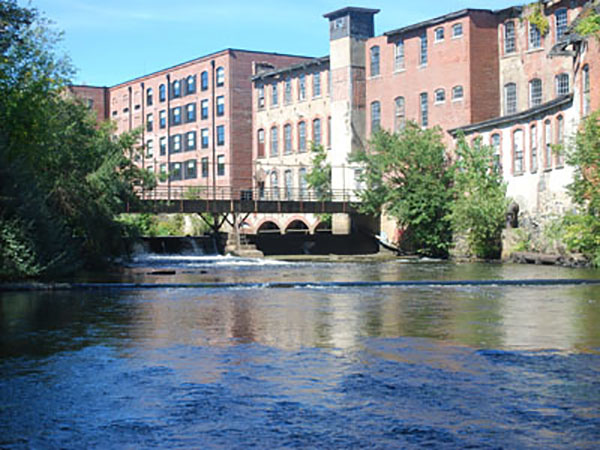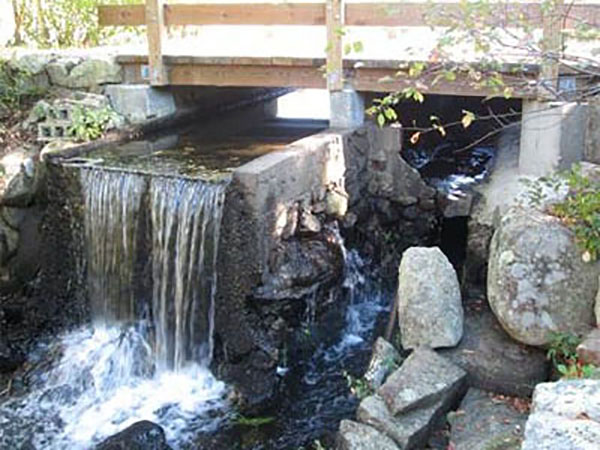
RI Coastal Resources Management Council
...to preserve, protect, develop, and restore coastal resources for all Rhode Islanders

...to preserve, protect, develop, and restore coastal resources for all Rhode Islanders
CRMC funds 9 habitat restoration projects
March 20, 2014, Wakefield – The RI Coastal Resources Management Council has awarded funding for nine habitat restoration projects through its RI Coastal and Estuarine Habitat Restoration Trust Fund.
The Council approved the funding at the March 11 semi-monthly meeting in Providence. Projects approved for funding include four salt marsh restoration projects, three anadromous fish passage projects, one coastal upland restoration, and one equipment request for RI Department of Environmental Management (RI DEM).
The Council awarded $62,523 to the Woonasquatucket River Watershed Council for the Manton Pond Dam Nature-Like Fishway Construction project in Johnston. This project will construct a nature-like fishway at the dam to complete the group’s long-running project to restore diadromous fish passage at different points along the Woonasquatucket River. Once this final obstruction is removed, the river will offer spawning habitat in both the river and Manton Pond for 40,000 river herring. The fishway will allow migratory fish access to nine acres of pond habitat and open up nearly a mile of river. This is the second consecutive year of funding for the project.
The Council also awarded $50,000 to RI DEM Division of Fish & Wildlife for the Factory Brook Fishway Construction project in South Kingstown. DEM, along with the National Oceanic and Atmospheric Administration (NOAA) and US Fish and Wildlife Service, plans to construct a fish ladder at a privately-owned dam to restore river herring to Factory Book and Factory Pond. The goal of the project is to restore unimpeded upstream fish passage and create river connectivity, as well as to restore herring passage to the primary spawning and rearing habitat in the 30-acre Factory Pond.
The Center for Ecosystem Restoration received $50,000 in funding for phase two of the Pontiac Dam Fish Passage Feasibility Study. The goal of the project is to identify a number of preferred restoration alternatives for the three-mile stretch of the Pawtuxet River in Warwick near the Pontiac Dam that would lead to long-term ecosystem improvements. These include restoring herring and other diadromous fish spawning habitat; improving ecological integrity, biodiversity and water quality in the Lower River and Narragansett Bay; improving public safety and protecting property and infrastructure by reducing flooding frequency and risk; and improving climate change preparedness and resiliency on the Lower Pawtuxet River.
The Council also approved $22,777 in funds toward forest understory restoration in Blackstone Park in Providence. The Blackstone Parks Conservancy, along with Providence Department of Parks and Recreation, plans to plant native plant species in the upland to slow the loss of topsoil from the park from erosion caused by storms, overuse and stormwater runoff down the park’s steep hillsides. Work will include repairing trails by lining them with logs, adding gravel, installing water bars and brakes, coir matting and laying down wood chips on trails where appropriate. The Trust Fund monies, in addition to DEM and Department of Transportation funding, will allow for more volunteer time to work on the upland area.
The Narragansett Bay National Estuarine Research Reserve (NBNERR) was awarded $20,000 toward Statewide Salt Marsh Mapping, which will build on prior efforts to gauge the health and resilience of Rhode Island’s coastal salt marshes. Evidence from the group’s monitoring suggests a rapid change in salt marsh vegetation in response to accelerating sea level rise, and broad-scale degradation of salt marsh has been captured by recent RI Salt Marsh Assessment monitoring efforts conducted at 40 marshes in the state. NBNERR plans to classify high, low and transitional marshes and build a statewide map that will help to further identify trends in salt marsh vegetation change. This information will be used to target and prioritize areas for monitoring, restoration and adaptation practices.
The RI Department of Environmental Management received $5,000 for excavator and flail mower repairs. This low ground pressure equipment is used statewide for mosquito abatement and control and wetland restoration.
The Warren Land Conservation Trust was awarded $5,000 toward the Jacob’s Point Salt Marsh restoration project. Jacob’s Point, a 47-acre marsh along the Warren River in Warren, is the site of a successful previous Trust Fund funded project to restore tidal flow to a restricted portion of marsh and reduce coverage of the invasive reed, Phragmites australis. This year’s funding will be used for additional adaptive management measures that will improve drainage in areas where water has become permanently impounded. The goal of the project is to reduce the areas of standing water, enhance native marsh vegetation and reduce potential mosquito breeding areas. Similar salt marsh adaptation projects were funded for Winnipaug marsh in Westerly ($5,000) and Calf Pasture Point in North Kingstown ($4,700).
Habitat restoration projects are funded through the RI Coastal and Estuarine Habitat Restoration Trust Fund and are selected from recommendations by the RI Habitat Restoration Team, established by CRMC, Save The Bay and the Narragansett Bay Estuary Program in 1998. Members of the team serve as a technical advisory committee for the CRMC as required by law. Funds for the program come from the state’s Oil Spill Prevention Administration and Response Act (OSPAR), established by the legislature following the 1996 North Cape oil spill. Each year, the Trust Fund and CRMC allocates $225,000 from the OSPAR account to habitat restoration projects in the state.
“For its eleventh year of funding, the CRMC had an outstanding pool of applications, including a number of shore adaptation projects, which will be vital as sea level rise threatens our coastal areas,” said CRMC Executive Director Grover Fugate. “Rhode Island’s coastal and estuarine habitats continue to be improved by our partners through this great program, and the state dollars provided continue to leverage millions more toward this important work.”
To date and including this year, the Trust Fund has awarded $2.5 million for 96 projects, which have leveraged more than $23 million in matching funds. In its eleven years, the Trust Fund has helped to restore over 300 acres of Rhode Island habitat, and this year’s funding will leverage an additional $629,000 in matching funds.
The full 2012-2013 Coastal and Estuarine Habitat Restoration Trust Fund report will be available on CRMC’s web site at http://www.crmc.ri.gov/habitatrestoration.html. Photos of the projects are available upon request.

Pontiac Dam. Picture courtesy of Center for Ecological Restoration.

Factory Brook. Picture courtesy of RIDEM.